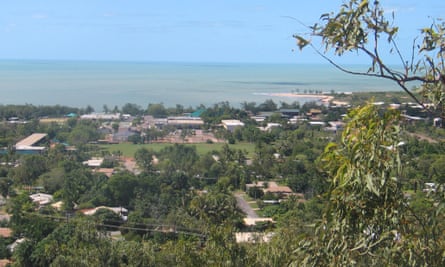Doctor Colin Smith made the biggest business decision of his life in mid 2013, buying the general practise in the mining town of Nhulunbuy. Six months later Rio Tinto announced the curtailment of its bauxite refinery, and with it more than 1,000 job losses.
The announcement would mark the beginning of what Smith and his fellow GP Sarah Chalmers say was one of the town’s worst ever years, with affected residents coming through the doors of Nhulunbuy’s only GP clinic.
In a presentation to the national rural health conference in Darwin last week, Chalmers and Smith reflected on the personal toll the last year took on them and their patients who are primarily from the Rio Tinto community.
Nhulunbuy, in remote north-east Arnhem Land, is a town owned and operated by Rio Tinto since 2007, when the mining company bought the Gove bauxite mine and refinery, established in 1963.
In 2013 the company announced it would be mothballing the refinery, slashing its workforce. Residents of Nhulunbuy and surrounding communities feared for the future.

In the following year the town’s population of about 4,000 dropped by nearly half, and as businesses and supermarkets closed, Qantas cut its services, and houses were left empty, the exodus began to take a toll on the mental health of those who stayed behind.
After the November 2013 announcement, even as residents left in droves, Smith and Chalmers began to notice a worrying trend. Their workload was not dropping.
“We realised our consultations were becoming longer and more complex,” Smith says in the presentation. “We weren’t seeing more patients but seeing them for longer.”
Patients were frequently coming in for mundane physical complaints, and then falling apart in the consultation room.
“There were so many emotions and mostly it boiled down to feeling stressed, and the obvious place to come was the practice,” Chalmers tells Guardian Australia.
“Whether they were very angry all the time or crying all the time, as a general rule people noticed that their emotions were a lot more extreme than normally.”
The two doctors broadened their skill sets, becoming counsellors, and sometimes even financial planners for their increasingly distressed clients who were facing unemployment or being forced to leave the town many had grown up in.
Fierce competition for jobs among those who wanted to stay bred a form of survivor’s guilt and friends started keeping secrets.
“People would come in [to the surgery] feeling guilty for having gotten a job because their neighbours and friends were also applying for jobs,” said Chalmers.
As longtime residents – both live with their families in Nhulunbuy – Chalmers and Smith felt the impact as well.
“One of the things that really affected me was listening to everybody’s very sad story about how they had had their lives significantly changed and were feeling very much that they had lost control of the situation,” says Chalmers.
“It kind of got to the point where it felt like I’d lost control of the situation. I’ve since been told that my behaviour during the last 18 months has been a little tough to bear at times.”
Labor MP for Nhulunbuy, Lynne Walker, says she was aware of the apparent rise in mental health issues, including increased ambulance callouts to incidents of self harm, although “it’s not something people want to talk about or put media releases out about”.
The doctors noticed some other trends. Liver function tests and cholesterol levels were going up. Patients also reported much more drinking, but it wasn’t just the town “drowning their sorrows,” Chalmers clarifies.
“There were lots and lots of farewell parties.”

At the peak of the exodus, the doctors say they saw three or four removalist van on any given day being packed up on the route to the surgery.
Businesses and services that didn’t yet need to downsize lost staff who followed their unemployed partners out of town. The schools lost students – Chalmers’ nine-year-old daughter has said goodbye to most of her school friends.
Houses still sit empty, and there are calls for the government and Rio Tinto to make the dwellings available for public housing. The waiting list in Nhulunbuy is more than 12 years – the longest in the Territory.
“It’s very difficult to explain to people – particularly my Yolgnu constituents – who come to me about public housing and say why can’t I have one of these empty houses?” says Walker.
Last year the NT government struck a deal with Rio Tinto to make 250 empty houses available to support new and existing businesses as part of a new, co-funded economic development entity, but not for public housing.
It’s also pledged to spend $1bn on services and infrastructure in the region.
Walker notes several new businesses opening up in town, and believes the worst has passed.
“We knew there would be a lot less people but we didn’t know what that population drop was going to look like and what that impact was going to look like,” she says.
“I think we’ve hit the low and we’ve definitely moved out of the trough. While there is still some uncertainty in certain areas, I think there’s a degree of confidence that the town will continue to move forward.”
Part of that uncertainty is around Rio Tinto’s next move.

As part of its lease agreement the company has local government-like responsibility to provide power, water, municipal services and maintenance.
“I doubt they would close the bauxite mine but there’s a lot of speculation about what they might do, including wanting to sell it,” says Walker.
“But whoever buys a bauxite mine buys a town and has responsibility for running that town.”
In November Developing East Arnhem said Rio Tinto estimated its bauxite mine would contribute more than $500m to the region over the next five years “through expenditure on salaries and wages and spending with local suppliers.”
The town is picking up the pieces, and “anything is going to be better than last year”, Chalmers says.
“[Nhulunbuy] took a huge hit. People who live in remote communities are often quite resilient people, that’s how you survive. The people who stayed have worked hard to maintain a community. For people moving in, it’s in their best interest to keep things going.
“We haven’t rolled over and died yet.”

Comments (…)
Sign in or create your Guardian account to join the discussion